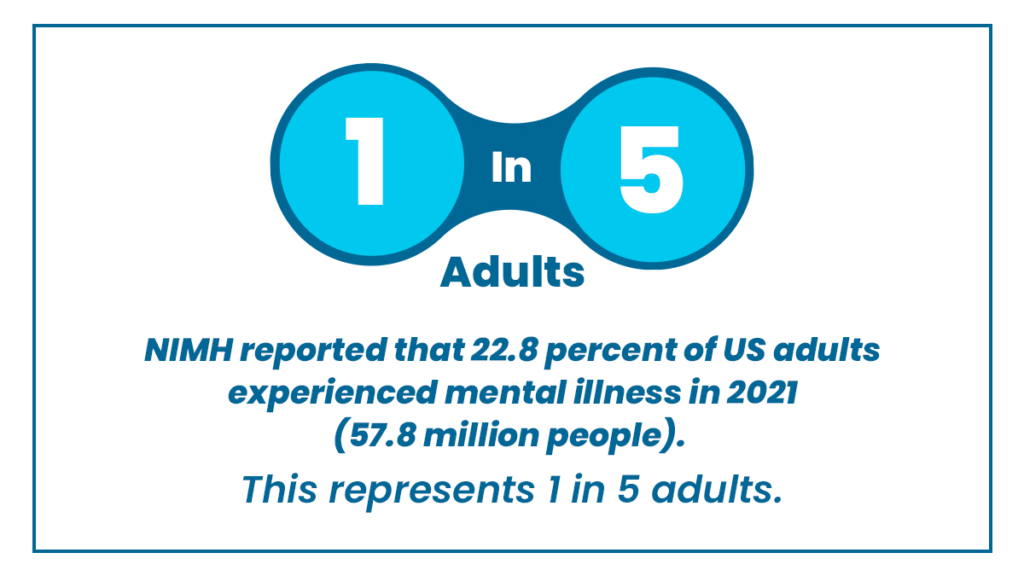
Mental health disorders are common conditions that affect a person’s thoughts, feelings, and behavior. These disorders can affect daily life to varying extents, from mild to severe.
The most commonly diagnosed mental disorders are anxiety disorders, mood disorders, personality disorders, psychotic disorders, eating disorders, and substance use disorders.
Therapy, medication, support groups, and lifestyle changes can manage mental health disorders.
Key Takeaways
Mental disorders are common, with about one in five American adults experiencing them at some point in their lives. Let’s take a closer look:
- Mental health disorders are common and can affect anyone, regardless of age, gender, or background.
- Symptoms can vary depending on the specific condition but may include changes in behavior, mood, and thinking patterns.
- Treatment options include psychotherapy, medication, lifestyle changes, support groups, and alternative therapies.
Seek help for mental health issues at The Haven Detox-Little Rock. Contact us at (501) 271-3342 and take the first step towards a better tomorrow.
Understanding Mental Health Disorders
Mental disorders are conditions that negatively impact a person’s thinking, mood, and behavior. These disorders can occur at any stage of life and last for at least two months.
These disorders can significantly impact a person’s normal functioning and negatively affect their quality of life.
The Telltale Signs
The signs and symptoms of mental disorders can be distinct and vary from one disorder to another. Some common symptoms include:
- Headaches
- Nausea
- Fatigue
- Changes in mood
- Feelings of hopelessness or sadness
- Difficulty sleeping
- Appetite changes
- Decreased energy levels
The Root Causes
The causes of mental disorders are complex and can include a combination of genetic, environmental, and lifestyle factors.
For example, people with a family history of mental disorders may be more likely to develop a mental disorder themselves. Environmental factors such as trauma or stress can also contribute to the development of mental illnesses.
In addition, lifestyle factors such as poor nutrition, lack of exercise, and substance abuse can increase the likelihood of developing a mental illness.
The Ripple Effects
The effects of mental disorders can be far-reaching and can affect a person’s relationships, work, and overall well-being. These disorders can lead to difficulties in personal relationships and poor work performance and can also increase the chances of the onset of physical health problems. They can also lead to social isolation and reduced quality of life.
Navigating Different Types of Mental Disorders
Understanding the different types of mental health disorders is crucial for recognizing and addressing the challenges faced by individuals living with these conditions.
Here are the most common types of mental disorders:
Anxiety Disorders
Anxiety disorders are mental health disorders that lead to persistent and excessive worry, fear, or anxiety. Various types of anxiety disorders include:
Panic Disorder: Those with panic disorder experience sudden, intense fear or anxiety, often with physical symptoms such as sweating, heart palpitations, and shortness of breath. These panic attacks can occur unexpectedly, and people with panic disorder often worry about having another attack.
Phobias: Phobias are intense, irrational fears of specific objects or situations. Common phobias include fear of heights, animals, or flying. People with phobias often go to great lengths to avoid the things or situations they fear.
Generalized Anxiety Disorder (GAD): People with GAD experience excessive worry and fear about everyday events, often with no specific trigger. This constant worry can interfere with daily life and cause physical symptoms such as muscle tension, fatigue, and restlessness.
Social Anxiety Disorder: This disorder is marked by a fear of social situations and being judged by others. People struggling with this disorder often avoid social situations or experience intense anxiety when they are in social situations.
Obsessive-Compulsive Disorder (OCD): OCD is characterized by unwanted, intrusive thoughts (obsessions) and repetitive behaviors (compulsions) that are difficult to control. People with OCD often feel bound to perform these rituals to relieve anxiety.
Post-Traumatic Stress Disorder (PTSD): PTSD is a condition that can occur after an individual experiences a traumatic event. Symptoms of PTSD can include flashbacks, nightmares, and intrusive thoughts related to the traumatic event.
Mood Disorders
Mood disorders refer to those mental health conditions that affect a person’s emotional state, causing them to experience significant changes in mood. There are various types of mood disorders, including:
Major Depressive Disorder (Clinical Depression): This disorder is marked by constant sadness or disinterest in once-enjoyable activities. Symptoms of major depressive disorder can include feelings of hopelessness, difficulty sleeping, changes in appetite, and decreased energy levels.
Dysthymia (Persistent Depressive Disorder): This mood disorder is characterized by long-term sadness and hopelessness. People with dysthymia may experience low energy, difficulty sleeping, and low self-esteem.
Bipolar Disorder: A type of mood disorder marked by extreme changes in mood that range from manic episodes, which involve high energy levels and feelings of euphoria, to depressive episodes, which involve low energy levels and feelings of sadness. Other symptoms of bipolar disorder may include sleep disturbances, irritability, and racing thoughts.
Cyclothymic Disorder: A mood disorder characterized by persistent mood swings that are less severe than those experienced in bipolar disorder. People with cyclothymic disorder may experience periods of hypomania, which involve high energy levels, and periods of depression, which involve low energy levels.
Personality Disorders
Personality disorders are marked by rigid patterns of thoughts and behaviors that lead to problems in personal relationships and daily life. Here is a breakdown of the six most common personality disorders:
Borderline Personality Disorder (BPD): People with BPD struggle with emotional instability and a lack of self-worth. They have a distorted self-image and experience intense and unstable emotions, often leading to impulsive behaviors, self-harm, and suicidal ideation.
Narcissistic Personality Disorder (NPD): Those with NPD have an exaggerated sense of self-importance and a lack of empathy for others. They feel entitled to special treatment and often exhibit grandiosity in their thinking and behavior. They may also fixate on fantasies of power, success, and beauty.
Antisocial Personality Disorder (ASPD): ASPD is marked by a disregard for the emotions and rights of others. People with this disorder may engage in impulsive and risky behaviors, violate social norms and laws, and exhibit a lack of empathy or remorse. They may also have a superficial charm or charisma, making them appear charming and outgoing.
Avoidant Personality Disorder (AvPD): People with AvPD experience intense anxiety in social situations and fear rejection or criticism. They have low self-esteem and may avoid relationships or social gatherings to avoid potential rejection. Individuals with AvPD may also experience feelings of inadequacy and may struggle to form close relationships.
Schizoid Personality Disorder (SPD): People with SPD have a limited range of emotions and may appear detached or aloof. They have little interest in social interactions and may prefer solitary activities. Individuals with SPD may struggle to express their feelings and have difficulty forming close relationships.
Obsessive-Compulsive Personality Disorder (OCPD): People with OCPD have a preoccupation with perfectionism, order, and control. They have rigid beliefs and values and may struggle to adapt to environmental or routine changes. Those with OCPD may also be overly critical of themselves and others, leading to problems in personal and professional relationships.
Psychotic Disorders
Psychotic disorders are severe mental illnesses that can cause a person to experience a loss of touch with reality. The following are the three most common types of psychotic disorders:
Schizophrenia: This chronic and severe mental illness can affect a person’s thoughts, emotions, and behaviors. People with this disorder may experience hallucinations, delusions, disordered thinking, and unusual or disorganized behaviors.
Schizoaffective Disorder: This combines symptoms of schizophrenia and mood disorders, such as depression or bipolar disorder. People with this disorder may experience delusions, hallucinations, disordered thinking, mood swings, and changes in energy levels.
Delusional Disorder: A mental illness marked by persistent and false beliefs not based on reality. People with this disorder may believe they are being followed, spied on, or persecuted. These delusions can cause significant distress and may impair an individual’s ability to function in everyday life.
Eating Disorders
Eating disorders are serious mental health issues that involve abnormal eating habits and a distorted body image. The following are the four most common types of eating disorders:
Anorexia Nervosa: A mental illness marked by an extreme fear of weight gain, a distorted body image, and an unwillingness to maintain a healthy weight. People with this type of eating disorder may restrict their food intake, excessively exercise, and have a preoccupation with food and weight.
Bulimia Nervosa: An eating disorder characterized by binge eating, followed by compensatory behaviors such as vomiting, using laxatives, or excessive exercise. People with bulimia may experience shame, guilt, and a preoccupation with weight and body shape.
Binge Eating Disorder: A mental illness characterized by recurring episodes of eating excessive amounts of food in a short period, followed by feelings of guilt, shame, and loss of control. People with binge eating disorder may use food to cope with emotions, stress, or boredom.
Eating Disorder Not Otherwise Specified (EDNOS): A eating disorder that does not meet the full diagnostic criteria for bulimia, anorexia, or binge eating disorder. People with EDNOS may engage in disordered eating behaviors such as restricting food intake, binge eating, or purging.
Trauma- and Stressor-Related Disorders
Trauma- and stressor-related disorders can develop in response to a traumatic or stressful event. The following are six common types of trauma- and stressor-related disorders:
Acute Stress Disorder (ASD): ASD develops in response to a traumatic event. Symptoms of ASD include intrusive thoughts, flashbacks, avoidance of triggers, and increased arousal. ASD typically resolves within a few weeks, but some individuals may develop post-traumatic stress disorder (PTSD).
Adjustment Disorder: A mental illness that develops in response to a stressful life event, such as divorce, job loss, or illness. Symptoms of adjustment disorder include anxiety, depression, and difficulty coping with daily life.
Attention Deficit Hyperactivity Disorder (ADHD): ADHD affects a person’s ability to focus, control impulses, and regulate emotions. Symptoms of ADHD include hyperactivity, inattention, and impulsivity. This disorder is typically diagnosed in childhood but can persist into adulthood.
Autism Spectrum Disorder (ASD): This neurodevelopmental disorder affects social communication and interaction. Symptoms of ASD include difficulty with social interactions, communication challenges, and repetitive behaviors or interests. ASD is typically diagnosed in childhood.
Oppositional Defiant Disorder (ODD): ODD is marked by a pattern of negative, defiant, and hostile behavior towards authority figures. Symptoms of ODD include arguing, defiance, and intentionally annoying others. ODD is typically diagnosed in childhood and can lead to relationships and academic or social functioning issues.
Conduct Disorder: This disorder is marked by a pattern of aggressive and antisocial behavior towards others. Symptoms include aggression towards people and animals, destruction of property, and a disregard for rules or laws. Conduct disorder is typically diagnosed in childhood and can lead to significant problems in social, academic, and personal functioning.
Dissociative Disorders
Dissociative disorders disrupt a person’s sense of identity, memory, or perception. The following are the three most common types of dissociative disorders:
Dissociative Identity Disorder (DID): People with DID experience a disruption in their sense of identity, with two or more distinct personality states or identities. These identities may have different memories, behaviors, and attitudes.
Dissociative Amnesia: A mental illness characterized by the inability to recall important personal information. People with dissociative amnesia may forget their names, identity, or past events. Dissociative amnesia is typically caused by a traumatic event and may involve selective or complete memory loss.
Depersonalization/Derealization Disorder: A mental illness characterized by a feeling of detachment or separation from oneself or one’s surroundings. People with this disorder may feel like they are in a dream, or their bodies or surroundings may feel unreal or distorted.
Substance-Related and Addictive Disorders
Substance-related and addictive disorders involve the use of substances or engaging in addictive behaviors. The following are three common types of substance-related and addictive disorders:
Alcohol Use Disorder (AUD): A mental illness that involves the excessive and problematic use of alcohol. People with AUD may face difficulty controlling their alcohol use, experience withdrawal symptoms when not drinking, and continue to drink despite negative consequences.
Drug Use Disorders: Mental illnesses that involve the problematic use of drugs, including prescription drugs, illegal drugs, or over-the-counter medications. People with drug use disorders may experience withdrawal symptoms when they do not use drugs, continue to use them despite consequences, and have difficulty controlling their drug use.
Gambling Disorder: A mental illness characterized by a persistent and problematic pattern of gambling behavior. People with gambling disorders may continue to gamble despite negative consequences, experience psychological and emotional symptoms when not gambling, and have difficulty controlling their gambling behavior.
Available Treatments for Mental Health Disorders
Mental health disorders affect millions of people in the US and can significantly impact a person’s quality of life. However, several effective treatment options are available to help manage and alleviate symptoms.
Here are five common types of treatments for mental health disorders:
Talk Therapy
Talk therapy, also known as psychotherapy, is a form of treatment involving regular conversations with a trained mental health professional. There are numerous types of talk therapy, including:
- Cognitive-behavioral therapy (CBT)
- Dialectical behavior therapy (DBT)
- Psychodynamic therapy
- Interpersonal therapy
- Acceptance and commitment therapy (ACT)
- Eye movement desensitization and reprocessing (EMDR)
Talk therapy can help individuals with mental health disorders to identify and manage negative thoughts, emotions, and behaviors. The therapy sessions are typically scheduled weekly or biweekly and can last a few months to several years.
Medications
Medications are often prescribed to individuals with severe symptoms of mental disorders as an effective treatment option.
There are many different types of medications used to treat mental disorders, including:
- Antidepressants
- Anti-anxiety medications
- Mood stabilizers
- Antipsychotics
- Stimulants
It’s important to note that medication may not be effective for everyone and can have side effects.
Lifestyle Changes
Lifestyle changes can also be beneficial when it comes to managing mental disorders. These changes may include:
- Eating a healthy diet
- Getting regular exercise
- Getting enough sleep
- Avoiding alcohol and drugs
- Practicing stress-reducing activities, such as meditation or yoga
Lifestyle changes can be incorporated into a person’s daily routine and positively impact overall well-being.
Support Groups
Support groups refer to groups of people who come together to share their experiences and provide emotional support to one another. There are many different types of support groups available, including:
- Peer support groups
- Family support groups
- Online support groups
Support groups can provide a safe and supportive space for people with mental disorders to connect with those who are going through similar experiences.
Alternative and Complementary Therapies
Alternative and complementary therapies are non-traditional treatments that can be combined with other forms of treatment. These therapies may include:
- Acupuncture
- Massage therapy
- Art therapy
- Music therapy
- Pet therapy
These therapies can help individuals with mental illnesses to relax and manage stress but are not a substitute for traditional treatments.
Frequently Asked Questions (FAQ)
What are the most common mental health problems?
Mental health problems are prevalent in the US and can affect anyone, regardless of age, gender, or financial situation.
According to the National Institute of Mental Health (NIMH), the most common mental health problems in the US include:
Anxiety Disorders: About 19.1 percent of US adults, or 40 million people, are affected by anxiety disorders each year.
Mood Disorders: About 9.5 percent of US adults, or 20.6 million people, experience mood disorders such as depression and bipolar disorder each year.
Personality Disorders: About 9.1 percent of US adults, or 19.3 million people, have been diagnosed with a personality disorder.
Eating Disorders: About 1.0 percent of US adults, or 2.5 million people, have been diagnosed with an eating disorder.
Substance Abuse Disorders: About 19.7 million adults in the US had a SUD in 2017, with 74 percent of those individuals struggling with an AUD.
What are the different types of mental illness?
Mental illness is an umbrella term that encompasses a variety of conditions that affect a person’s thinking, mood, behavior, or overall functioning.
Some of the most common types of mental illness include anxiety disorders, mood disorders (such as depression and bipolar disorder), personality disorders, eating disorders, and substance use disorders.
Other types of mental illness include psychotic disorders, dissociative disorders, trauma-related disorders, and obsessive-compulsive disorder (OCD).
Can mental illness be cured?
Mental illness is a complex condition that can vary in severity and duration. While there is no definitive cure for mental illness, many individuals can manage their symptoms effectively with the proper treatment and support.
Treatment options may include medication, therapy, lifestyle changes, and support groups. With proper treatment and support, many individuals with mental illness can lead fulfilling and productive lives.
It’s important to seek professional help if you experience symptoms of a mental health problem, as early intervention can improve outcomes and quality of life.
The Haven Detox-Little Rock: Where Hope is Restored
Are you struggling with mental health issues and unsure where to turn for help? You’re not alone. The Haven Detox-Little Rock offers comprehensive residential treatment for individuals with mental health concerns.
Our team of health professionals will provide you with a thorough assessment, personalized treatment plan, medications, and a range of evidence-based therapies to help you achieve your goals.
Don’t wait to seek the help you deserve. Mental health issues can be overwhelming, but you can overcome them. The Haven Detox-Little Rock is dedicated to helping you achieve recovery and live a fulfilling life.
Contact us today at (501) 271-3342 to learn more about our mental health treatment options.




